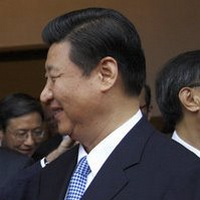The Nobel Committee's decision to award jailed Chinese democracy activist Liu Xiaobo the 2010 Peace Prize came just days before China's Communist Party elite anointed political princeling Xi Jinping as President Hu Jintao's clear successor, highlighting the two Chinas that now seem to be passing one another like ships in the night. One China is propelled from below by a coastal workforce that is increasingly self-confident in its skills and accomplishments and growing income. The other, larger China is managed from above by political leaders who increasingly worry over the nation's social stability as they grow more self-defensive in their ruling style.
Both Chinas exhibit rising nationalism, which is natural enough, given how much the nation has opened itself up to the outside world in recent years. It's hard to be a chauvinist until you actually meet some foreigners. And yet even today, outside of China's major, super-connected coastal megalopolises lies a vast interior where foreigners remain uncommon enough to draw stares from most people. As that interior belt undergoes a similar transition in coming years, China will continue to both Westernize and become decidedly more Chinese -- exacerbating tensions both internally and abroad.
What binds the two Chinas together today is the public's overwhelming lack of interest in politics and the leadership's desire to keep it that way. We in the West fantasize -- ominously -- about that dynamic extending into a "forever" future, fearing that the Chinese will never crack the "dictatorship code." But the world has yet to witness a large, developed economy that hasn't succumbed to democracy -- a dish best served cold to an aging, expanding middle class. China has one, but it also has a far-larger, interior rural poor -- a vast underclass that, if successfully integrated into the Chinese "miracle," will provide the economy and its technocratic masters a couple more decades of extensive growth opportunities.

